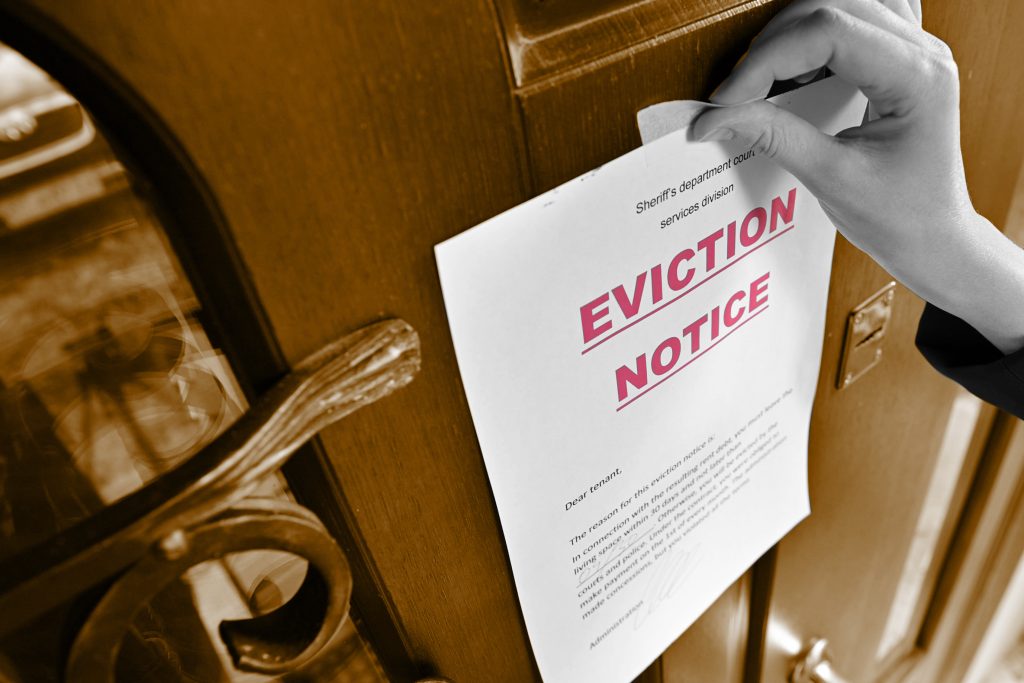Can I Pay Rent After Receiving an Eviction Notice? Exploring Your Options and Rights
Facing the prospect of an eviction notice can be daunting, raising questions about your ability to pay rent and retain your housing. In this guide, we’ll delve into the crucial question: Can you pay rent after receiving an eviction notice? By understanding your options, rights, and legal considerations, you can navigate this challenging situation with clarity and confidence.
Importance of Addressing an Eviction Notice Promptly
When an eviction notice arrives, time becomes of the essence. Prompt action is essential for safeguarding your rights and exploring potential solutions. An eviction notice is a formal communication from your landlord, indicating their intent to terminate your tenancy due to unpaid rent or other lease violations.
Ignoring an eviction notice can have serious consequences, including potential eviction and a negative impact on your rental history. By responding promptly, you can demonstrate your willingness to address the situation and find resolutions.
Reviewing the Terms of the Eviction Notice

Every eviction notice contains specific terms, deadlines, and instructions. To gain a clear understanding of your options, carefully review the notice’s details. Pay close attention to:
- The date by which rent must be paid or actions must be taken
- The amount owed, including any late fees or penalties
- The consequences of non-compliance with the notice
- Any available avenues for negotiation or communication
By comprehending the eviction notice’s terms, you can make informed decisions and explore potential pathways for resolving the situation.
Communication with the Landlord
Open and transparent communication with your landlord is pivotal when facing an eviction notice. Initiating a conversation can lead to understanding, potential solutions, and a more favorable outcome. Here’s how to approach this essential step:
1. Notify Your Landlord: Reach out to your landlord as soon as you receive the eviction notice. Express your willingness to address the situation and your commitment to resolving outstanding rent payments.
2. Discuss Payment Options: Inquire about potential payment arrangements or plans that allow you to catch up on missed rent. Landlords may be open to negotiating terms to prevent eviction.
3. Explain Your Situation: If you’ve experienced unexpected financial challenges, be open about your circumstances. Providing context can lead to empathy and a willingness to work together.
4. Document the Conversation: Keep a record of all communications with your landlord, including emails, phone calls, and written correspondence. This documentation can serve as evidence of your efforts to resolve the matter.
Exploring Payment Options Post-Eviction Notice
After receiving an eviction notice, you might wonder if paying rent is still an option. While eviction notices signal serious intent, paying your overdue rent can sometimes prevent further legal actions. Here’s what to consider:
1. Timely Payment: If you can manage to pay the outstanding rent before the eviction deadline, it might halt the eviction process. Contact your landlord to inform them of your intention to pay promptly.
2. Confirm Acceptance: Ensure that your landlord is willing to accept the payment and halt eviction proceedings upon receipt. Document this agreement for your records.
3. Communicate the Payment Plan: If you need more time to gather the funds, propose a realistic payment plan to your landlord. Demonstrating your commitment to repayment can show responsibility and goodwill.
4. Consult Local Regulations: Research local laws and regulations related to eviction processes and rent payments. Understanding your jurisdiction’s rules can provide insights into the possibilities available to you.
In the following sections, we’ll delve deeper into negotiation strategies, legal considerations, and seeking professional advice when dealing with paying rent after receiving an eviction notice.
Negotiating with the Landlord
Effective negotiation can be a powerful tool when seeking to pay rent after receiving an eviction notice. Approach the conversation with a willingness to find common ground and explore mutually beneficial solutions:
1. Propose a Payment Plan: Outline a clear payment plan that details how you’ll catch up on overdue rent. Highlight your commitment to fulfilling the agreement and returning to a timely payment schedule.
2. Offer a Lump Sum: If possible, consider offering a lump-sum payment to settle the outstanding balance. This demonstrates your determination to address the issue promptly.
3. Emphasize Your Intent: Communicate your intention to rectify the situation and avoid further disputes. Express your desire to continue as a responsible tenant.
4. Be Open to Compromise: Be open to compromise during negotiations. Landlords may appreciate the flexibility and a genuine effort to find a solution.
Legal Considerations and Tenant Rights
Understanding your legal rights as a tenant is crucial when navigating paying rent after receiving an eviction notice. Legal considerations play a significant role in your options and potential outcomes:
1. Review Lease Agreement: Examine your lease agreement for any clauses related to eviction, late payments, or rent-related issues. Familiarize yourself with your contractual obligations.
2. Tenant Protection Laws: Research tenant protection laws in your area. Some jurisdictions have regulations that provide tenants with additional time to rectify non-payment before eviction proceedings.
3. Unlawful Evictions: Familiarize yourself with laws governing lawful evictions. Unlawful eviction attempts may be subject to legal action.
4. Seek Legal Advice: If you’re unsure about your legal rights or the best course of action, consider consulting with a legal professional specializing in tenant-landlord matters.
Seeking Legal Advice
When dealing with complex legal matters such as paying rent after receiving an eviction notice, seeking legal advice is a wise step:
1. Consult a Tenant Attorney: A tenant attorney can provide personalized guidance based on your specific circumstances and local laws.
2. Clarify Legal Standing: An attorney can help clarify your legal standing and options, ensuring you make informed decisions.
3. Mediation and Representation: In some cases, an attorney can mediate between you and your landlord, potentially leading to favorable resolutions.
4. Document Review: If you’re uncertain about your eviction notice’s legality, an attorney can review it for compliance with local laws and regulations.
In the upcoming sections, we’ll explore steps to resolve outstanding payments, document agreements, and conclude with a comprehensive understanding of the nuances involved in paying rent after receiving an eviction notice.
Resolving Outstanding Payments
Resolving outstanding payments is a key step in addressing an eviction notice and maintaining a positive relationship with your landlord. Follow these steps to ensure a smooth process:
1. Fulfill Agreements: If you’ve negotiated a payment plan with your landlord, make sure to adhere to the agreed-upon terms. Timely payments demonstrate your commitment to resolving the issue.
2. Keep Records: Keep detailed records of all payments made, including dates, amounts, and methods of payment. This documentation can be valuable in case of any disputes.
3. Confirm Receipt: Whenever you make a payment, request a confirmation or receipt from your landlord as proof of payment.
Documenting Agreements and Actions
Documenting your actions, communications, and agreements is crucial for maintaining transparency and avoiding misunderstandings:
1. Written Agreements: If you and your landlord reach an agreement on payment terms, document the agreement in writing. Both parties should sign and retain a copy for reference.
2. Communication Logs: Maintain a log of all communications, including emails, messages, and letters exchanged with your landlord. This log can serve as evidence of your efforts to address the situation.
3. Keeping Records: Organize all documents related to the eviction notice, negotiations, and payments in a secure location for easy access.
Preventing Future Issues
Learning from the experience of receiving an eviction notice can help you prevent similar situations in the future:
1. Budgeting: Develop a budget that includes rent as a priority expense to avoid falling behind in payments.
2. Communication: Maintain open lines of communication with your landlord. If you foresee difficulties in paying rent, communicate your situation in advance.
3. Financial Planning: Create an emergency fund to cover unexpected expenses, ensuring you’re prepared for unforeseen financial challenges.
Navigating Rent Payment After Receiving an Eviction Notice
The journey of addressing rent payments after receiving an eviction notice can be complex and emotionally charged. By taking proactive steps, understanding your rights, and seeking professional advice if needed, you can navigate this challenging situation with confidence.
Remember that each situation is unique, and there’s no one-size-fits-all solution. By leveraging negotiation skills, legal knowledge, and open communication, you can work towards resolving outstanding rent payments, maintaining your tenancy, and preventing future issues.
The journey of addressing rent payments after receiving an eviction notice can be complex and emotionally charged. By taking proactive steps, understanding your rights, and seeking professional advice if needed, you can navigate this challenging situation with confidence.
Remember that each situation is unique, and there’s no one-size-fits-all solution. By leveraging negotiation skills, legal knowledge, and open communication, you can work towards resolving outstanding rent payments, maintaining your tenancy, and preventing future issues.
As you move forward, consider this experience as an opportunity for growth and financial responsibility. Establishing clear lines of communication with your landlord, familiarizing yourself with local tenant laws, and documenting agreements will serve you well in any future rental situation.
Lastly, remember that seeking guidance from legal professionals, financial advisors, and tenant advocacy organizations can provide valuable insights and support. The journey may be challenging, but with determination and the right resources, you can effectively address rent payment concerns and secure your housing stability.
FAQs: Paying Rent After Receiving an Eviction Notice
Q: Can I pay rent after I’ve received an eviction notice?
A: Yes, in many cases, you can pay rent after receiving an eviction notice, but prompt action is crucial to avoid further complications.
Q: What happens if I ignore the eviction notice and don’t pay rent?
A: Ignoring an eviction notice can lead to legal action and potential eviction, negatively affecting your rental history.
Q: Should I communicate with my landlord after receiving an eviction notice?
A: Yes, open communication is vital. Reach out to discuss your situation, negotiate payment plans, and explore options.
Q: Can I negotiate with my landlord to pay the rent in installments?
A: Yes, negotiating a payment plan with your landlord can help you catch up on overdue rent and prevent eviction.
Q: What are my legal rights after receiving an eviction notice?
A: Your legal rights depend on local laws and regulations. Consult tenant protection laws in your area for insights.
Q: Can I make a lump-sum payment to settle the overdue rent?
A: Yes, if feasible, offering a lump-sum payment to clear the outstanding balance might be an option to explore.
Q: Are there any laws protecting tenants from eviction in specific situations?
A: Some jurisdictions have tenant protection laws that provide additional time for addressing late rent before eviction proceedings.
Q: Should I consult a legal professional if I receive an eviction notice?
A: Consulting a tenant attorney can provide personalized advice and clarify your rights and options.
Q: Can my landlord legally evict me without following proper procedures?
A: Unlawful evictions are not permitted. Familiarize yourself with eviction laws to protect your rights.
Q: What should I do if I disagree with the reasons stated in the eviction notice?
A: Review your lease agreement and seek legal advice to address any discrepancies or disagreements.
Q: How should I document conversations with my landlord about the eviction notice?
A: Maintain written records of all communications, including emails, letters, and notes from phone conversations.
Q: Can I pay rent directly to the court or a third party after an eviction notice?
A: Some jurisdictions allow tenants to pay rent to the court or an escrow account during disputes. Research local rules.
Q: What happens if I pay rent after the eviction deadline mentioned in the notice?
A: Paying rent after the deadline might not prevent eviction. Communicate with your landlord to discuss options.
Q: Can I continue paying rent regularly even after an eviction notice?
A: Consistent rent payments can demonstrate your commitment to resolving the issue and may lead to resolution.
Q: Can I seek mediation services to resolve rent payment issues post-eviction notice?
A: Mediation can be an option to explore, helping you and your landlord reach a mutually agreeable solution.
Q: What should I do if I can’t afford to pay the full overdue rent all at once?
A: Propose a realistic payment plan to your landlord, outlining how you intend to catch up on rent over time.
Q: Should I keep copies of rent payment receipts as proof of payment?
A: Yes, keeping records of all payments, receipts, and agreements can protect your interests in case of disputes.
Q: Can I request an extension to pay rent from my landlord after an eviction notice?
A: Discussing a payment extension with your landlord might be an option, but it depends on their willingness.
Q: What can I do to avoid receiving an eviction notice in the future?
A: Develop a budget, communicate proactively with your landlord, and prioritize rent payments to prevent future issues.
Q: Are there financial assistance programs available to help with overdue rent payments?
A: Depending on your location, there might be government or community programs that provide rental assistance during financial hardships.




